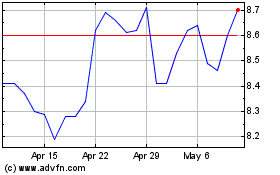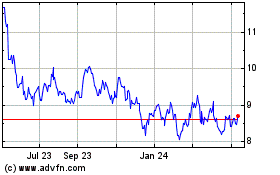By Stu Woo
LONDON -- Telecommunications giant Vodafone Group PLC has a
mantra: Be No. 1.
Or No. 2.
U.K.-based Vodafone, the world's second-biggest mobile carrier
by subscribers, is trying to keep that position by having the most
-- or second-most -- customers in each of its 26 countries.
"It's not really about being the leader," Chief Executive
Vittorio Colao told analysts last month. Vodafone believes the top
two players in telecom markets -- and it doesn't matter if they are
first or second -- are able to differentiate themselves through
superior networks and services. By focusing investments in these
two areas, the leading operators can justify higher prices.
"The gap versus No. 3s is not only stable, but even increasing,"
Mr. Colao said, adding "it's about really creating a two-tier
market."
Even after a $130 billion windfall from the 2014 sale of its
Verizon Wireless stake, Vodafone has so far eschewed big, global
expansion. Under Mr. Colao, a 55-year-old Italian reserve military
officer who took over as CEO in 2008, the company left the consumer
U.S. market and has plowed investment into Europe and the
developing world instead.
Vodafone's biggest competitors are typically formerly
state-owned fixed-line giants still catching up in the mobile age.
It earned GBP41 billion ($50 billion) in revenue for the last full
fiscal year and ranks below only China Mobile Ltd. in terms of
global subscribers.
Over two years, Mr. Colao spent about $24 billion across his
empire, which is concentrated in Europe, Africa and India, to
expand high-speed mobile networks, the pillar of its marketing
campaigns. Vodafone also spent about $20 billion in 2013 and 2014
to buy major cable operators in Germany and Spain, and it is
expanding its wired cable and internet network so it can sell the
telecom industry's Holy Grail: a "quad-play" package that offers
mobile, landline telephone, cable and internet services on one
bill.
The results so far are mixed: Vodafone said last month that its
plan was paying off in parts of Europe, but proving much more
expensive than anticipated in India.
Overall, Vodafone's organic revenue, which excludes
foreign-exchange movement, grew 2.2% in the third quarter of 2016,
outperforming the average 1.6% growth of major Europe-based telecom
firms, according to Raymond James analyst Stephane Beyazian.
Leading the way over the past six months was Germany, with 2.3%
organic growth, and Italy, at 1.7%. But Vodafone's organic revenue
declined 2.7% in its home market of the U.K. -- where it is the No.
3 mobile operator behind BT Group PLC, which operates the EE brand,
and Telefónica SA's O2. Mr. Colao blames the shortfall partly on
billing problems and customer-service complaints related to a new
computer system.
Even more costly has been defending its No. 2 status in India.
New mobile carrier Reliance Jio Infocomm Ltd., funded by India's
richest man, has offered free service for at least a month to get
new customers. Vodafone wrote down the value of its India business
by EUR5 billion ($5.3 billion) earlier this month, citing the
competition.
"It is very hard to compete with someone who gives stuff for
free," Mr. Colao said.
Vodafone was formed in Newbury, England, in 1984 and spun off
from military and electronics conglomerate Racal Electronics Group
in 1991. It was one of the world's first mobile-focused telecom
companies, and obtained licenses in a hodgepodge of countries early
in the cellphone era and via two big deals.
It merged with AirTouch Communications, a San Francisco-based
mobile carrier with world-wide holdings, in 1999. The next year, it
acquired Mannesmann AG, a German telecommunications business with
European operations.
In 1999, Vodafone merged its U.S. mobile operations with those
of Bell Atlantic Corp., with the latter renaming itself Verizon
Communications Inc. They called their joint venture Verizon
Wireless, with Verizon owning 55% and Vodafone the other 45%.
Verizon Communications had long tried to buy out Vodafone's shares,
but the two didn't reach an agreement until 2013. The sale closed
in 2014.
Vodafone gave back $84 billion from the sale to shareholders --
the largest single return in modern corporate history. A chunk of
the remainder went to pay taxes and reduce debt.
The rest of those funds helped bankroll Vodafone's two-year
network-improvement program. The project, which mostly wrapped up
this past spring, focused on expanding Vodafone's fourth-generation
mobile network, or 4G, in Europe and both its fourth- and
third-generation networks in emerging markets such as India.
For years, Vodafone and John Malone's Liberty Global PLC have
publicly flirted with the idea of a combination. The two companies
expect to complete a merger of their operations in the Netherlands
later this year, creating a 50-50 joint venture. Speaking at a
Morgan Stanley conference last month, Mr. Colao and Liberty Global
CEO Mike Fries said the Dutch tie-up wasn't necessarily indicative
of future deals. But Mr. Colao kept the door open.
"We see the world the same way," Mr. Colao told investors,
describing Mr. Fries. "Is this the first trial of something bigger?
Not necessarily....But of course it helps to know each other."
Write to Stu Woo at Stu.Woo@wsj.com
(END) Dow Jones Newswires
December 10, 2016 08:31 ET (13:31 GMT)
Copyright (c) 2016 Dow Jones & Company, Inc.
Vodafone (NASDAQ:VOD)
Historical Stock Chart
From Mar 2024 to Apr 2024

Vodafone (NASDAQ:VOD)
Historical Stock Chart
From Apr 2023 to Apr 2024
